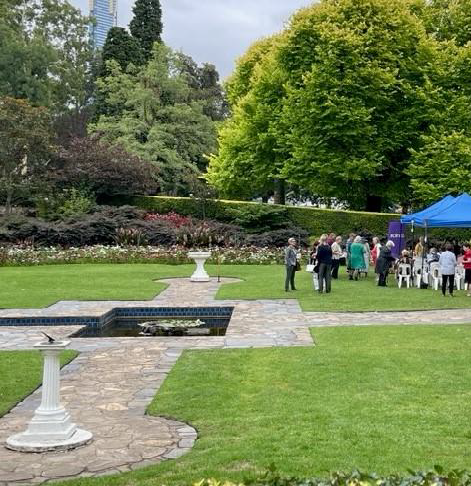 |
We collected items for women in need, to be donated to Impact for Women.
Coral Ross AM, our speaker is a founding Director and Chair of AGEC [Australian Gender Equality Council the members of which represent over 500,000 women in the workplace. Coral has had an esteemed career in local government and is currently the National Vice President of the Australian Local Government Women’s Association. A professional journalist with more than 20 years’ experience, Coral shared some of her experiences in gathering news from around the world.
Full details of the day and Coral’s speech are in the December Newsletter.
Individual Members Visit Potter Museum of Art at the University of Melbourne
On Thursday October 30th from 12 noon, there were 20 Individual Members and friends, led by Convenor Sheila Byard OAM, who enjoyed their visit to the Potter Museum of Art at the University of Melbourne, , seeing a unique Exhibition “65,000 Years: a Short History of Australian Art“. This was extremely comprehensive, engaging, and it times confronting, which made many of us vow to return before the exhibition closes on November 22nd. There were works of art and artifacts on loan from the NGV and many other galleries and collections, all of which demonstrated the incredible artistic skill and legacy of Indigenous artists, and the impact of colonialisation on the lives of Aboriginal people. Thank you Sheila, for organising this Individual Members visit, a Millie Peden excursion, honouring this previous valued member.

My Voice My Vote by Pam Hammond, Education Adviser
My Voice My Vote started as a result of research finding that young people were disengaged with the democratic processes. We hope that the students who attend will go on to better grasp the intricacies of our democratic system. Since 2014, 40 different schools have participated, some many times, and a total of 600 students. These events have raised students’ awareness of the rights and responsibilities of voting; gender issues in local and state governments; lack of diversity in local organisations and councils; attitudes of young people to voting; when women and First Nations people were able to vote; giving voice to students about the Role of Treaty in achieving Reconciliation and Social Media – a blessing or a curse.
The 2025 theme: What is special about Australian
Democracy was designed to have students examining our democracy and
comparing with other countries. The event commenced in Queen’s Hall at 9:15,
then moved into the Legislative Council Chamber, where Elida Brereton,
President NCWV, welcomed guests, panel members, teachers, and students, then
introduced the keynote speaker Lucy Skelton. She was part of the Melbourne
Girls’ College team and speaker at My Vote My Voice in 2018 and 2019. Lucy has
had many interesting roles since then. She realised that being involved in
politics was the way to influence change and show that young people should be
there, so she ran for Parliament only losing by 3000 votes. With nearly a
decade of experience in advocacy and volunteering Lucy is now a policy analyst,
CEO and founder of FORE Australia, a social enterprise which assists
organisations get ideas to decision makers. Last year, she joined the team at
Global Voices, where she helps lead delegations of young Australians to international forums.
Lucy challenged the students ‘What will you do
after your speech?’ She outlined three steps: have a clear Ask – what is
the issue; Identify who to approach, why reach out/trust them; what do you want
them to do. Another factor is choosing the right level of government. We then
played the Jurisdiction Game. She encouraged all to get politically involved
and not to be concerned about age. You gain more access when you are involved.
Mentoring can assist in your development.
The schools participating were: Firbank Grammar, Jiayuan Charity Music School, Al Siraat College, Mullauna Secondary College, Melbourne Girls’ Grammar School, MacRobertson Girls’ High School, Star of the
Sea College, Rosehill Secondary College, Melbourne Girls’ College, Ringwood
Secondary College. Most students spoke clearly, making eye contact with the
audience, all addressed the theme extremely well, with different emphases, including compulsory voting; women voting/standing for parliament before other countries; preferential voting; access to parliamentarians; local govt system. The panel noted all of this and gave general feedback at the end. Their assessments of each group have been used to nominate Awards. Matt Fregon MP, Deputy Speaker, spoke about voting and the responsibility of MPs, congratulating the students and encouraging them to become involved.
Pam Robinson AM, NCWV Council Member: Wow, what a
great morning of Student Presentations. An absolute winner, which provided a
valuable experience for the students presenting in Parliament House, and for
their schools, as well as others attending. Leaving Parliament House, I
wonderfully came across one of the boy students on his phone saying 'Hi Mum, it
was really, really good' and at the bottom of the steps down to Spring Street,
a bunch of the girls stopped me to say they were going to ask their teacher and
parents if they can join NCWV, asking me ‘it's free for us to join isn't it? Can we just come to some things if not all?’. My reply: Yes, Yes.
From one of the guests: May I congratulate you and
your “National Council of Women” team for the wonderful session
you organised with so many schools covering our youth view of explaining “Why
our Democracy is special”. The students were informed, passionate, articulate
and all-round fantastic. Watch out world - here they come! Well equipped they
are to do so.





NCWV Council Meeting, Thursday 3 July 2025
Twilight meeting, 5:15 – 7:00pm; Ross House, 247/251 Flinders Lane Melbourne, and by ZOOM.
We were delighted that Dr Simone McCarthy PhD, Executive Dean Research Fellow, Deakin University, Institute for Health Transformation was our Keynote Speaker. Simone briefed us on Young Women and Gambling – women’s vulnerability to gambling: research, issues, and potential harm reduction strategies.
Dr McCarthy’s PhD considered Australian women’s lived experiences of gambling and gambling-related harm, and the practical and political responses to addressing women’s vulnerability to gambling through a gendered lens; and focused on a range of determinants that influence women’s consumption of harmful products and contributes to gender inequity. See July Newsletter for her informative talk.
Over the last 25 years National Council of Women Australia has passed resolutions on Gambling. The Resolutions are set out below:
Internet Gaming (Melbourne 2000)
The National Council of Women of Australia
affirms its absolute opposition to the hosting of Internet gambling sites in Australia
calls on the Commonwealth Government to urgently develop ways of banning access to overseas gambling sites to people in Australia, and
calls on the Commonwealth Government to explore ways of using international treaties and obligation to control Internet gambling.
Electronic Gambling (Sydney 2008)
NCWA calls on the Federal Government and through its Constituent Councils, the State and Territory Governments, to address the major social problem of electronic gambling by legislating to commit to the removal of all electronic gaming machines from Pubs and Clubs within five years.
Sports Betting
National Council of Women of Australia Ltd. meeting in Conference requests Minister for Communications, the Hon. Malcolm Turnbull, to revisit the "Broadcasting Services Amendment (Advertising for Sport Betting) Bill 2013” with a view to reintroducing it and strengthening its provisions with particular reference to the banning of live betting advertisements and gambling advertisements on television during recognised children's television viewing times.
Gambling (Alice Springs 2014)
That NCWA urges the Commonwealth Government to immediately develop strategies to reduce problem gambling in our society. Such a strategy should incorporate recommendations such as those of the Australian Medical Association in order to address the needs of those most at risk, our youth, and children through:
education to demoralise gambling in society
intervention programs to redress the rapidly growing youth gambling problem
elimination of cultural practices in schools whereby children are encouraged to participate in pseudo gambling associated with major sporting events
May Forum on UN CSW Conference - Thursday 1 May 2025
The Speakers at this NCWV May Forum were:
Dr Donnell Davis, UNAA National President and a Director with Soroptimist International South East Asia Pacific; Board member National Foundation for Australian Women 2013-2017; Founder of Envirobusiness Foundation- Sisters4Sustainability;. She holds a doctorate in urban climate governance, University Southern Queensland, and completed post doctorate at Stanford University in Innovation, Ethics, design and accelerated interdisciplinary.
Dr Davis spoke about the Pact for the Future, adopted in Sept. 2024, which includes a Global Digital Compact and a Declaration on Future Generations. The Pact covers a broad range of issues including peace and security, sustainable development, climate change, human rights, digital cooperation, youth and future generations, gender, and the transformation of global governance.
There were 159 countries represented, down from 189. Australia had a strong voice and advocacy with 120 delegates, leading in e-safety and youth wellbeing. There were intergenerational conversations, but as 9 – 19 year olds were often neglected, there is a need to focus on their vulnerabilities. Donnell stressed that there are laws in place to protect women and girls in many areas, but not all.
There are 5 dangers: Danger, Disease, Distress, Duress, Denied Freedom. Great Grandfathers words: ‘Granddaughters will shape the future’.
Website: Adolescents and Youth
Another vital area – Climate Health, which will disproportionately affect women. Over 39֠ can be fatal, and pathogenic diseases are aggravated by climatic hazards. Also, 1/3 of Pacific countries are threatened to be inundated.
Donnell will be speaking in Canberra and in Parliament about outcomes of CSW and how Australia can help shape the future.
Sarah Barnbrook, a delegate for Soroptimist International of the South East Asia Pacific at CSW69 and a member of NCWV, is a committee member of State of the World's Children (SoWC), Founder of AFK (Away from the Keyboard) Inc, through which she is leading efforts to build safer digital environments while fostering human connection in an increasingly online world. As a teenager, she was targeted and groomed online by an older predator, a manipulation that led to a coerced marriage. Her experience highlights the serious and long-term risks of online grooming and exploitation. Rather than remain silent, Sarah transformed this experience into a powerful platform for change. She is an international Speaker, Author, Not-For-Profit Advocate and was awarded Volunteer of the Year and recognised for Youth Impact at the Women Changing The World Global Awards in London in 2025. She is a Professional Member of Australian Women in Security Network (AWSN); currently serves as the Company Secretary for the Australian Gender Equality Council (AGEC), and is the Chief Revenue officer at Women 4 STEM.
Sarah expressed similar concerns to Donnell about the future of CSW, as prior to the start, President Trump had black banned some countries from entering USA and had dissolved some departments including the Education Department.
CSW was huge in delegates and sessions. The Australian delegation met regularly to share what they had attended. Sarah was particularly drawn to Emerging Technologies, AI and the effect on children, with violence online and Child Marriage especially daunting. Sarah’s workshop was Unseen Risk of AI for the Girl Child about which she is passionate. See: Beautiful.ai - Empowering Women Globally: Reflections on CSW69
Sarah states: ‘I am committed to leveraging my experience and expertise to drive meaningful progress through advocacy, education and collaborative action. By amplifying grassroots voices, fostering intersectional solutions and empowering next generation of leaders, we can build a more just and equitable world for all.’ ‘The closing declaration gained consensus, but a lot was lost! We need to stand ground, nothing further to be lost. No time for complacency! We need to hold governments accountable.’
April Council Meeting, 3rd April, 12:00
Ahead of the upcoming Federal election, National Council of Women Victoria invited NFAW to ‘Shine the Gender Lense on the policies of various political parties’. Speaker: Professor Helen Hodgson, Chair National Foundation for Australian Women (NFAW). Dr Hodgson has lectured in Taxation at UNSW, Edith Cowan University and Curtin University. She was also a Member of the Legislative Council in Western Australia between 1997 and 2001. Helen holds qualifications in accounting, business law and taxation, is a Chartered Tax Advisor, a Registered Tax Agent, a Fellow of the Australian Society of CPA’s and a member of the SMSF Association. Her areas of expertise include trusts, superannuation, the taxation of small business entities and tax policy, and she was a participant at the 2010 Tax Forum. She is also a member of the Tax Advisory panel for ACOSS, the Social Policy Committee of the National Foundation for Australian Women and the Women in Social & Economic Research group. She now chairs the NFAW Social Policy Committee.
Helen gave us some background stating that ‘Women Budgets’ started in the 1980s as part of Federal budgets, but have reduced, so in 1988 NFAW was formed to highlight gender responsible budgeting. They have prepared papers using a gender lens for 25 Federal budgets! The 2025 Statement, see Gender Lens on the 2025 Election | NFAW summarises the issues that Helen spoke of at the meeting. She did emphasise that the Stage 3 Tax cuts need to be more targeted at the lower end.
March Council Meeting 6th March
Venue: Australian Institute of International Affairs Vic, 13th Floor, 356 Collins St. (between Elisabeth and Queen Streets)
Speaker: Denise Mary Allen — Antarctic Medal recipient 1989
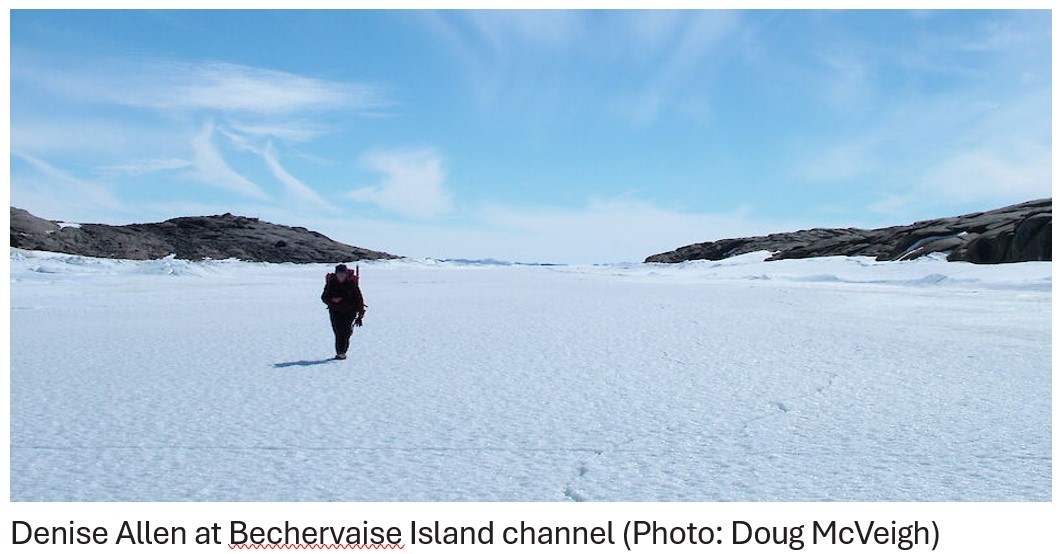
Denise Allen has been one of the pioneers for the involvement of women in the Antarctic. She has spent six winters in Antarctica as an observer for the Bureau of Meteorology, including two consecutive winters. She has carried out a water sampling program for Monash University in the Vestfold Hills Lakes and supported station operations by marking safe routes on the ice plateau, establishing fuel dumps for traverses and providing assistance to many scientific programs. See March Newsletter for details
64th Pioneer Women’s Ceremony
This was held at the Pioneer Women’s Memorial Garden in Kings Domain, Melbourne. This event celebrated Victorian Pioneer Women in Agriculture. In 2025 it is 30 years since women in Australia were legally considered farmers under the law and therefore the Australian Bureau of Statistics recognised, under occupations in the Census, that women can be farmers rather than simply "farmers' wives”.
Two parliamentarians gave short addresses at the start of the event. Michaela Settle MP, Parliamentary Secretary for Agriculture and Regional Development, highlighted the $20 billion agricultural sector and the critical role of the Victorian Rural Women’s Network in championing and empowering women into leadership and influential decision-making positions. Emma Kealy MP, Deputy Leader of the Nationals, Shadow Minister for Agriculture and Mental Health, acknowledged the valuable work of the NCWV in supporting women’s advocacy and leadership. She paid tribute to women pioneers, past and present, sharing stories of 19th-century women who, despite raising large families, made significant contributions to their towns and regions in the mid-late 1800s. She emphasised that, while being a mother is an important role, it does not define a woman’s entire identity. Emma highlighted the example of Dr Kendra Clegg, a present-day pioneer, who led the Grampians emergency recovery response while balancing farm work and made significant contributions to the region and community.
NCWV End of Year Festive Luncheon - Hazel Edwards OAM on Writing for Young People
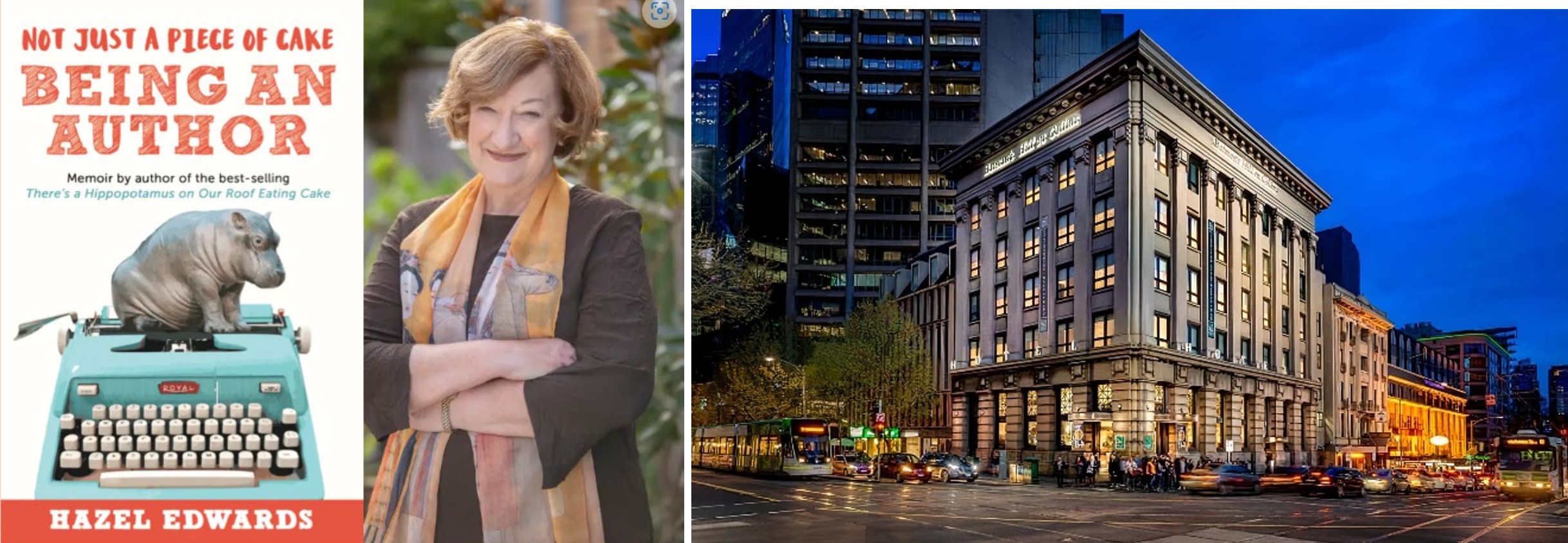
As National Council of Women Victoria Inc has long been interested in children’s education and books that encourage respect for girls and other cultures, we were delighted to announce that our guest speaker at the 2024 Annual Luncheon was Hazel Edwards OAM Australian Educator, Author, Speaker and Literacy Ambassador.
Hazel has written books for children, teachers and adults. Her best-known publication is the children’s picture book classic There’s a Hippopotamus on Our Roof Eating Cake (1980), now a series of picture books, classroom play scripts, a musical stage production and a short movie.
Hazel is a prolific author with over 200 books across numerous genre - Picture Books, Easy Reading Books, Young Adult Fiction, Adventure Writing, Adult Mysteries and Non-Fiction.
Her memoir ‘Not Just a Piece of Cake’ (2023) takes the reader behind the books. It’s about risk-taking: intellectual and physical. This quirky memoir shares the diverse workstyle of a long-term author, who also has a family. And who writes for adult as well as child audiences. See December Newsletter for details of her talk.
Students Take Over Parliament!
The outstanding annual student event My Vote My Voice, conducted by the National Council of Women of Victoria, was held in the Legislative Council Chamber of Parliament House Melbourne on Friday August 9th 2024, 9:00am-12:30pm.
Keynote Speakers: Meena Singh, Commissioner for Aboriginal Children &Young People; Missi Joyce, Youth Council.
Students from 12 government and independent schools addressed the topic: Social Media – A Blessing or a Curse, designed to encourage students to consider the effect of Social Media on themselves, their peers and the wider community.
The schools were: MacRobertson Girls HS; Rosehill SC; Al Siraat College; Jiayuan Charity; Kingswood College; Beaumaris SC; Camberwell HS; Star of the Sea College; Melbourne Girls Grammar; Elwood College; Firbank Grammar; Ivanhoe Girls.
Meena’s speaking notes
Thank you for that introduction.
Before I begin, I’ll take a moment to acknowledge the Traditional Owners of the land we are meeting on, the lands of the Wurundjeri People of the Kulin Nation. I pay my respects to their Elders past and present and acknowledge wherever we are on this continent known as Australia, a continent of hundreds of countries, we are on lands over which sovereignty was never ceded.
I make this acknowledgement as part of my own cultural protocols as a Yorta Yorta woman on my mother’s side, and out of respect as an Indian woman on my father’s side.
Thank you so much for having me today. I am certain both my parent’s ancestors did not envisage me in a place like this!
In doing my research about the National Council of Women Victoria, I was delighted to see that in the first ever congress in 1903, there was a focus on children’s rights. And I see that for over 100 years, you have championed the rights of the most vulnerable people in this state through the inclusion of women’s and children’s voices.
Thank you for your work, and my goodness I love trailblazing women!
I’m the Commissioner for Aboriginal Children and Young People, and I work alongside the Principal Commissioner Liana Buchanan at the Commission for Children and Young People.
The Commission is an independent statutory body that is focussed on the safety and wellbeing of children and young people in Victoria.
We do this in a few ways:
- We monitor spaces where children and young people are vulnerable. This includes children and young people who are in out of home care and youth justice detention centres.
- We give advice to the government about their laws and policies impact on children and young people, and we encourage them to take your views into account.
- We also require organisations where children and young people go to learn, to play sport, to practice their culture or religions, to get services, anywhere, we required those places to be child safe organisations, where children and young people can be themselves, feel safe, and are free from abuse and harm. And, if for some reason abuse or harm happens, we require organisations to respond in the appropriate way for the individual child or young person, and so it doesn’t happen again.
We do all this work with input from our Youth Council, a group of clever, brave and talented children and young people with a wide range of life experiences who give us advice on how we make sure their voice is reflected in the advocacy we do. They challenge us, they make us think differently, and they make the Commission work better for children and young people.
Sometimes the best way to do that is for the two Commissioners to step aside, and just let young people talk. And soon, I look forward to hearing from you all on this important issue.
But first…
Social media – a blessing or a curse?
The proposed ban on social media that has been in… social media for the last few months is such an interesting response to the challenges that social media presents.
And social media does present challenges and there are concerns we should absolutely be worried about.
We hear about horrible bullying and vilification of every kind (ablism, racism, religious persecution, homophobia, transphobia, body shaming, you name it) from keyboard warriors who are embolded by their handled ‘idiots-are-us’. (As a golden rule, I try not to read the comments section, but sometimes…).
We see children and young people’s privacy being breached when parents and care givers post their images and information online without their consent. At what age can a child give consent to be put online?
And at possibly the worst end of the scale, we know about adults with ill intentions using social media to get at children and young people, virtually and then physically.
Because I’m a person who cares about the most vulnerable people in her community, I am passionate an about keeping children and young people safe, physically and online. Because I am a commissioner, I have tools to go about ensuring this, such as the Child Safe Standards.
But does a complete ban on social media deal with these issues, or does it just push the issue further down the track, and leave young people, at the age of 16, to suddenly be exposed to a whole new means of communication but with very little by way of understanding how to navigate it?
And, does a ban mean that we rob children and young people of the things that are brilliant about social media? The things that are worth protecting?
I’m clearly not a young person, but I use social media every single day. And I love it.
I get information, far more quickly, than I can from websites or print media, and from a range of sources that are not available to me in other formats. I learn about lives that are so very different to mine, people displaying resilience in the face of oppression and hatred, and I am reminded of our connected humanity.
I discover amazingly talented people – creators, artists, musicians, athletes, thinkers, dancers – and I marvel at their skills and think how lucky we are to live in a world where their talent can be shared with others.
I connect with family and friends, from across the street to across the world. I meet new friends, new dogs, cats and watch endless videos of baby animals or kids doing the funnies things as they navigate and make sense of this world.
I find networks of support – complete strangers raising others up, wishing each other ‘one more day’, ‘stay with us’, ‘you’ve got this’, ‘we’re here for you’.
With social media, I can choose my own adventure. I have learnt how to protect what I share, to block and disengage with people who are simply not good people, I take a break every now and then to recharge.
I cannot for a second imagine someone saying to me we’re going to take this away from you, this tool that allows you so much, because of some bad people.
Because social media is a tool through which we carry out interpersonal connections and interactions. And behind each of these interpersonal connections and interactions is a set of ethics, of values that shape how we behave and how we treat each other. And for me, that is what we should be focussed on when we talk about making social media safe for children and young people.
And we must be serious about punishing those people who make it unsafe for children and young people and restricting their access to social media.
Because, to my ears, the ban sounds a little too much like victim blaming. It pushes the issue down the road and doesn’t deal with the problems.
It also denies the agency of children and young people to make informed decisions about how they use these tools. Just as children and young people should have information to make appropriate decisions about drug and alcohol use, about sexual activity, about a whole range of other important issues.
When I was preparing for this piece, I asked our Youth Council members to share some of their thoughts on the ban. I want to read just one of the responses:
Instead of a ban, I think a better approach would be to provide education on safe and responsible use of social media, along with parental guidance and age-appropriate restrictions. This way, young people can learn to navigate social media safely and responsibly from an early age, minimising the potential risks while still reaping the benefits.
I truly could not say it better.
What I don’t hear in this issue, this debate, is the voices of children and young people. Too many decisions are made with the very old (and outdated) idea that children should be seen, not heard.
I’m very much looking forward to hearing you all have a say on an issue that you absolutely must be heard on.
Thank you again for having me, and for your time.
Missi then spoke of her experiences after leaving home. Her siblings were broken up, so needed to keep in touch via social media, support each other. She also stated that young people need to make mistakes. If they have no experience of social media, when young and enter the ‘real’ world, they can be vulnerable to the negatives aspects.
Along with connections mentioned, you can find your passion - interest groups with the same focus e.g. music.
Students presentations followed. Some groups had carried out research, collected data from their peers and others to gain wider views, to inform presentation of their finding. This year’s students made a valuable contribution to the debate on the effect of Social Media on our young people and society.
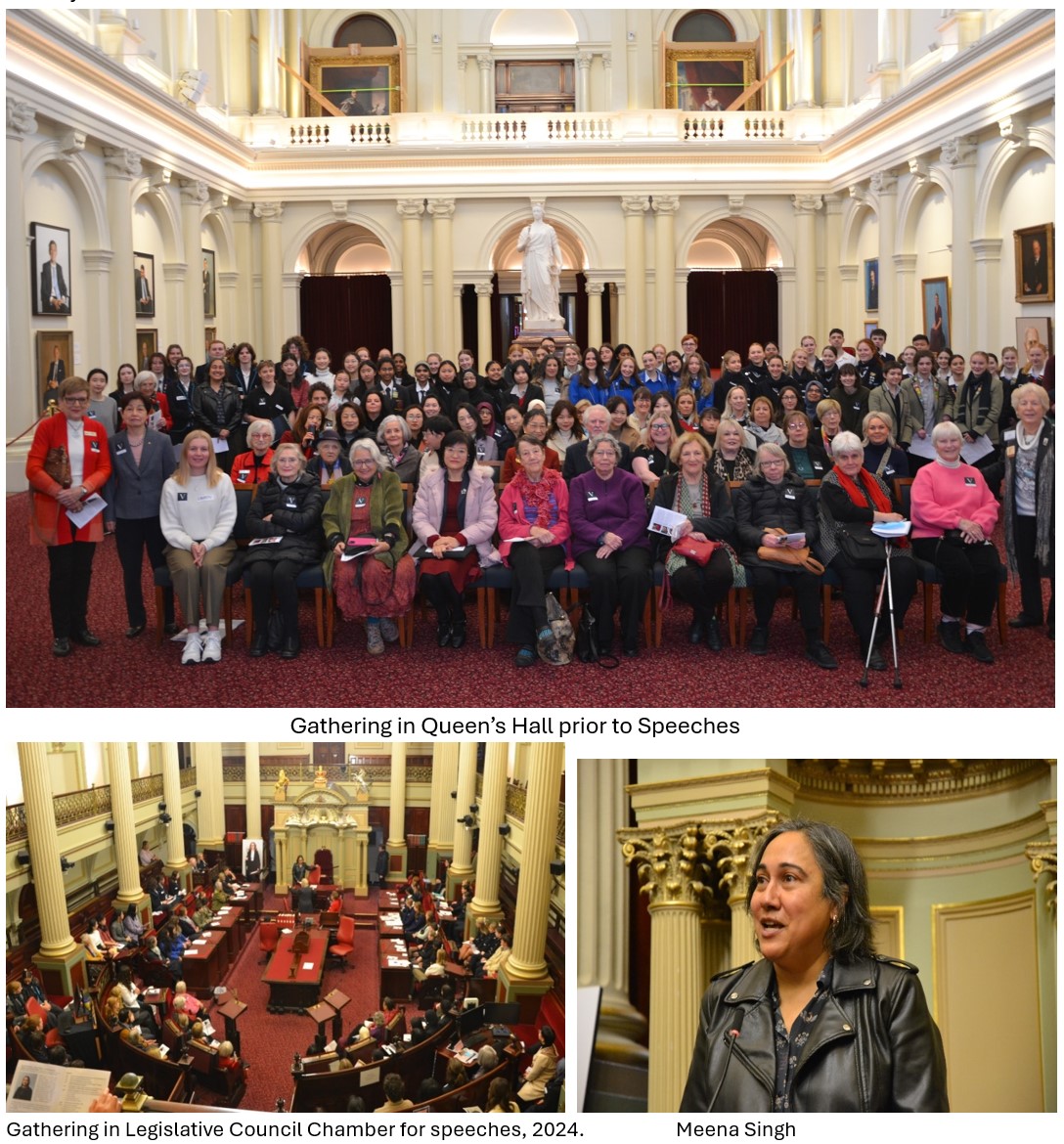
August Council meeting Thursday 1 August
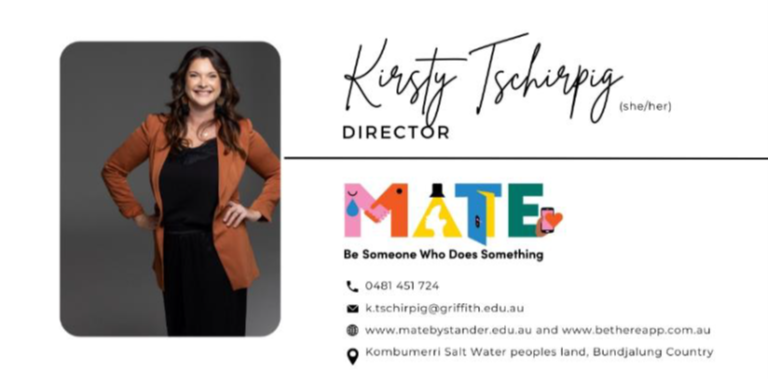
Kirsty discussed MATE, a tool designed to make it easier for bystanders to recognise signs of domestic violence and to empower them to safely intervene. This has been developed by her team at Griffith University to educate the community on how to safely interact with a person who is acting/speaking inappropriately. We can all learn from this.
A report on this is in the August newsletter.
The Senate Standing Committee on Community Affairs, References Committee: Inquiry into Issues related to menopause and perimenopause
The NCWV Council is delighted that the committee has accepted our submission as public and allocated it submission number 161. The document (#161) can be read on the Inquiry website.
We thank Prof. Cassandra Szoeke, NCWV Health Adviser; Alex Jeffery, President NCWV Geelong; Elisabeth Newman AM and Robyn Byrne, Coordinator Standing Committee Victoria, for their excellent work on this along with NCWA.
The committee is required to report by 10 September 2024 and the report will be published on the committee's website.
June 6 Individual Members & Council Meeting
Terese Edwards, CEO, Single Mothers Families Australia Inc.
Single Mothers Families Australia Inc (SMFA) is an organisation that has been championing single mothers and their families since 1973. SMFA was founded ‘out of wedlock’ in Melbourne. It was started to fight the condoning of forced adoptions and the refusal of parent payments. We salute single mothers' talents, diversity and resolve and work with and for single mothers to advance equality, fairness, and respect. Structural and gender disadvantages are choices, and the wrong decisions have harmed too many single mother families who live with financial distress, fear, and stigma. We provide a range of platforms that give voice and respect to the lived reality for single mother families. Our key focus is single mother families affected by hardship, poverty, and gender-based violence.
Terese’s talk is in the June Newsletter.
NCWV MAY FORUM, Thursday May 2 was entitled: Domestic and Family Violence, a National Epidemic
We all have a role to play in ending family violence (FV). Hopefully our Forum developed a shared understanding of actions being taken, how policy can be reformed, services improved and how effective strategies can be embedded in practice and innovation across the FV sector.
We were delighted that Tania Faha, CEO of Safe and Equal, a peak body for specialist FV services that provides support to victim survivors in Victoria, spoke. Their vision is a world beyond family and gender-based violence, where women, children and all people from marginalised communities are safe and respected.
Rena Francesco, Director, Strategy, Policy and Reform - Family Violence Command at Victoria Police, a role she has performed since November 2021, also spoke.
Dr Deborah OAM, NCWV Committee member, spoke on the Elsie Conference and its outcomes in addressing reduction in FV.
Details from each speaker is in the May Newsletter.
April 4 Individual Members & Council Meeting focussed on: ‘Women’s Information and Referral Exchange’ Inc (WIRE) with CEO Jade Blakkarly
Jade stressed that they have extended theirr service to respond to needs of non-binary as well as gender-diverse people. We’re the only Victoria-wide free information, support, referral service by women and gender diverse people, for women and gender diverse people. WIRE is dedicated to integrating diversity, inclusion, and equity into every aspect of our organisation, aiming to enhance the well-being of our clients and staff. We are steadfast in our commitment to identify and eliminate any instances of discrimination in the services we provide. Jade shared that WIRE has had many changes over the 40 years, learning along the way and listening to women whose voices have been silent, recognising the differences. See April Newsletter for more information
March Council Meeting 2024
The March meeting was the first of our late meetings to accommodate those who have difficulty attending at lunchtime. Our speaker was Sue Karzis, the CEO of State School’s Relief (SSR), an incredibly important charity that provides uniforms, shoes, educational resources and other essential school items for disadvantaged students in 85% of Victoria’s state schools. Sue has propelled the charity to record numbers of impact, assisting over 74,000 financially disadvantaged Victorian school children in 2022/23 with the number and value of items distributed exceeding 305,000 and $7.07M respectively. This simple and practical service ensures that all students can attend school in warmth and comfort with a sense of belonging and improved self-esteem, which in turn enhances their educational engagement. See March Newsletter for more information.
63rd NCWV Annual Pioneer Women’s Ceremony – Celebrating Women in Sport- Monday, January 22, 2024
This annual event, conducted by National Council of Women of Victoria, was held once again at the Pioneer Women’s Memorial Garden in the King’s Domain, Melbourne.
As the XXXIII Olympic Summer Games, will be held in Paris from 26 July to 11 August, 2024, as well as the significant women sporting events in 2023, including the Matilda’s soccer success, the growth of the AFL Women’s program, the Australian Women’s Cricket Team successes internationally, Ash Barty winning Wimbledon and the Australian Open tennis and the development of girls’ and women’s sports at local levels, NCWV felt acknowledging the women pioneers in sport who have forged the way for the current positive environment is was timely.
The speakers were Louise Zedda-Sampson sharing her research on the first Australian Women’s Cricket Team in 1874; Kathy Watt OAM, the Olympic and Commonwealth Games gold medal cyclist speaking of the issues when she started racing; and Sarah Morgan, NCWV Youth Adviser sharing her experiences with AFLW, hockey, swimming, teaching in Islamic schools and the Grass Ceiling. Details and photos in the February Newsletter.
NCWV Annual End-of-the Year Festive Luncheon
This gathering began at Noon in the William Angliss Restaurant, celebrating the achievements of the year with 66 members and guests, acknowledging the wonderful work of Immediate-past-President, Ronniet Milliken, and welcoming new President, Elida Brereton. Ronniet presented Elida with the NCWV gold badge. There was also the presentation of certificates to two Hon. Life Members, Pam Hammond and, in absentia, Barbara Brown from Shepparton. Elida acknowledged the passing of Janet Galley OAM, NCWV’s Hon. Archivist.
Our thanks to Sephanie Liu who donated 50 Calendars for 2024 produced by Australia Post which includes in March photo of the NCWV Floral Garden created for the 120th Anniversary. They are available for $10 (rrp $20), contact NCWV at: [email protected]
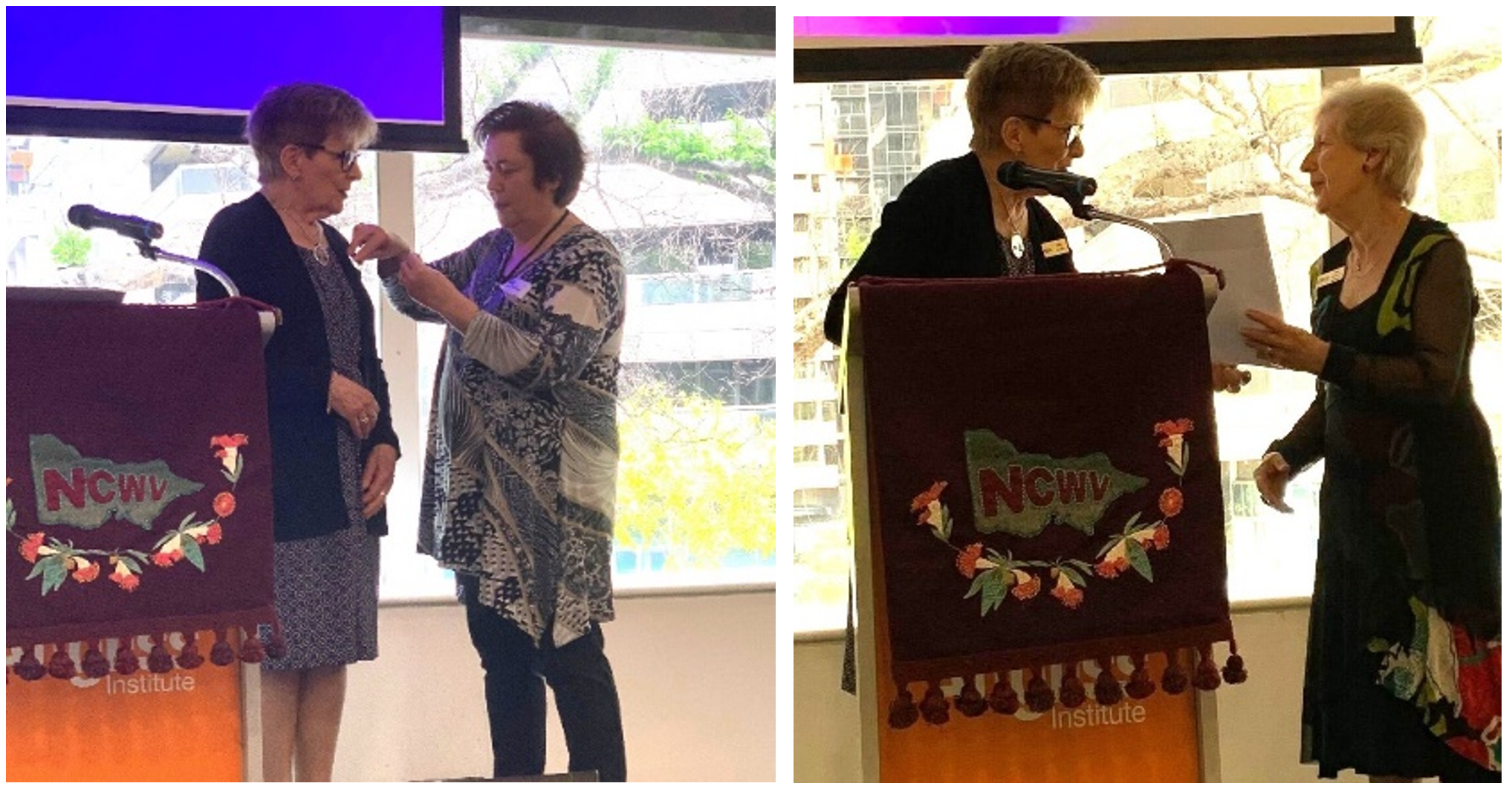
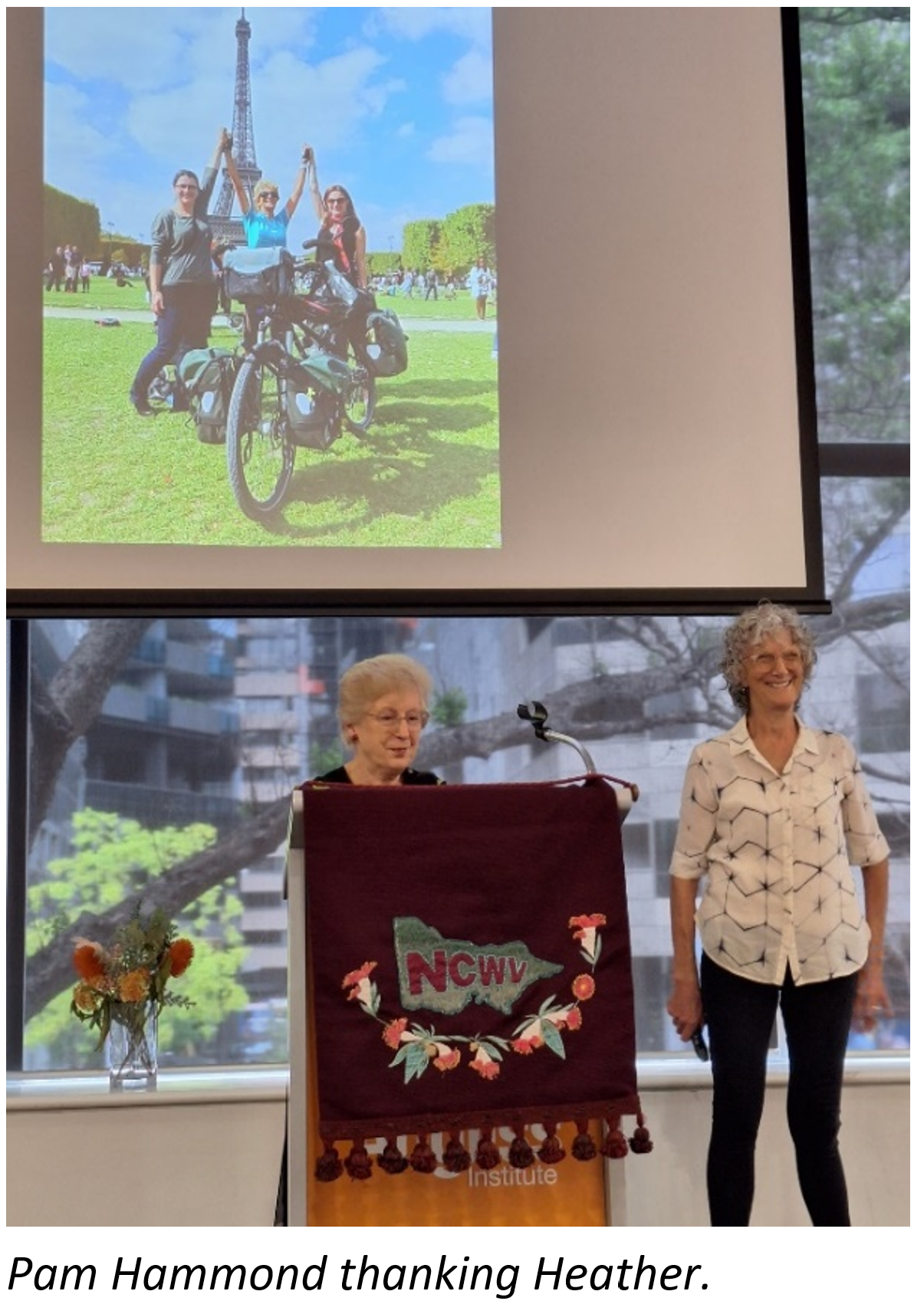
Our speaker was a real dynamo: Heather Burge, is a retired secondary Maths and Science teacher, and a passionate cyclist with a love of long-distance touring. Over the course of two trips, in 2007 and in 2014 (interrupted by the arrival of a string of grandchildren) she completed a (sometimes solo) journey, by bicycle from Beijing to Paris, through China, Kyrgyzstan, Kazakhstan, Russia, Iran, Turkey and along the beautiful Danube through Bulgaria, Romania, Serbia, Slovenia, Austria, Switzerland into France and on to Paris. She told us this story of the countries and people met along the way, with wonderful photos to illustrate the journey.
She spoke of the joys and challenges of cycling in unknown places way beyond one's comfort zone.
A bit of a risk-taker, she took shortcuts on occasions to reduce distances which at times proved very challenging, including steep and narrow, winding tracks more than roads, with spectacular scenery.
Heather took us through the reality of going into the ‘great unknown’ including dealing with the basics. She shared quirky anecdotes and humorous tales about areas we would probably never explore. Her lasting joy was experiencing the kindness of people in all these countries and seeing the differences in women’s lives.
Attendees were requested to donate items for women escaping domestic violence. The response was most generous, and were delivered to Impact for distribution.
Health Week - Wednesday 6 September from 12 until 2pm at the Melbourne Town Hall Yarra Room
Ronniet Milliken welcomed Councillor Dr Olivia Ball - City of Melbourne representing NCWV’s Patron, the Hon Lord Mayor Sally Capp AO. Cr Ball is portfolio lead for Health, Wellbeing & Belonging and deputy portfolio lead for Aboriginal Melbourne and Deputy Chair of Council’s Disability Advisory Committee.
As a psychologist, Olivia has an understanding of health issues. She outlined what the City of Melbourne is doing: At local government level, we don’t run hospitals. Most local governments are getting out of aged care. The only direct healthcare we provide are vaccinations and maternal & child healthcare where a healthy life starts. Local government also has an important role in building community and other social determinants of health – like connection to nature, access to public pools, recreation facilities, affordable housing and healthy eating.
The state of your health is correlated to distance from the nearest park or nature reserve, and the distance to your nearest fast-food outlet. Health is both physical and mental. Local government has an active role in addressing isolation and loneliness providing community facilities and supporting community activities and efforts to create community. For example:
-
Funding Project Respect – a Melbourne organisation by and for women trafficked for sexual exploitation.
-
Immunization nurses have been caring for refugees who have fled Afghanistan and Ukraine with initial home and immediate healthcare and social needs addressed in before being resettled across the city and state.
-
A collaborative effort, Project Night Justice, working with Victoria Police, Crime Stoppers, Full Stop Australia and Melbourne Uni to make our streets safer for women and gender-diverse Melburnians. This offers training and accreditation to nightlife venues to recognize and support women experiencing harassment or assault.
-
funding training for hairdressers in how to recognize and refer clients experiencing domestic violence.
-
The City of Melbourne is currently converting a disused industrial building in Little Bourke St into 50 studio apartments for people sleeping rough or at risk of homelessness – with secure floors for women.
Provide free menstrual products in council libraries and municipal bathrooms to help address period poverty.
The September 2023 newsletter has more about this event.
Students Took Over Parliament! Inspiring!
My Vote My Voice, Mon 7 August 2023; 9:15am-12:45pm
The outstanding annual student event My Vote My Voice, conducted by the National Council of Women of Victoria, was held in the Legislative Council Chamber of Parliament House Melbourne. Students from government and independent schools, covering many cultural backgrounds in Melbourne, addressed the topic: What are the barriers to Human Rights in Australia? How can we begin to overcome them. Secondary students from 10 schools made group presentations of their findings from research and, in one case, a survey.
Prior to these student presentations, our Keynote speaker was Lauren Matthews, Director of Programs at the Victorian Equal Opportunity and Human Rights Commission. She leads the policy, legal, education, consulting and information functions of the Commission - focused on addressing discrimination, human rights, racial and religious vilification, and change and suppression practices. The Education and Engagement Branch is focused on providing clear, accessible legal information and helping individuals and organisations to understand their rights and responsibilities, via training sessions, consultancy and their Enquiry Line. Previously, Lauren practiced law as a solicitor within Australia, including human rights law, discrimination, refugee, criminal law, family law, child protection, and family violence. For 10 years, Lauren served internationally, primarily with the United Nations Office of the High Commissioner for Human Rights, Geneva, as well as in field operations in Bosnia and Herzegovina, and Nepal. She served as an International Legal Adviser in Sri Lanka for the International Independent Group of Eminent Persons monitoring the national Commission of Inquiry into serious human rights violations. “Only positive outcomes are coming from Victoria’s Charter of Human Rights. It is a vehicle to promote and protect the values of Victoria for a diverse, equal, respectful and just state.” For details of her speech, see August Newsletter.
Student presentations followed this most appropriate and informative start to the morning. There were students from 10 schools: Bayside P-12 College Williamstown Campus, Al Siraat College Epping, Kingswood College, MacRobertson Girls High School, Elwood College, Western English Language School, Footscray High School, Rosehill Secondary College, Firbank Grammar, Melbourne Girls Grammar. A group from each school addressed the topic: What are the barriers to Human Rights in Australia? How can we begin to overcome them. The students presented brilliantly, showing how well they had researched the topic, speaking clearly and with passion. All concluded that a Federal Human Rights Charter was essential and urgent. For more details, see August Newsletter.
Panel members, Fiona Patten, past MLC, Cr Kylie Spears, past Mayor and President of the Australian Local Government Women’s Association, and keynote speaker Lauren Matthews were extremely impressed, suggesting that the students consider local government and/or State government positions in the future! The official photographer has uploaded photos to Dropbox.
Award Winners
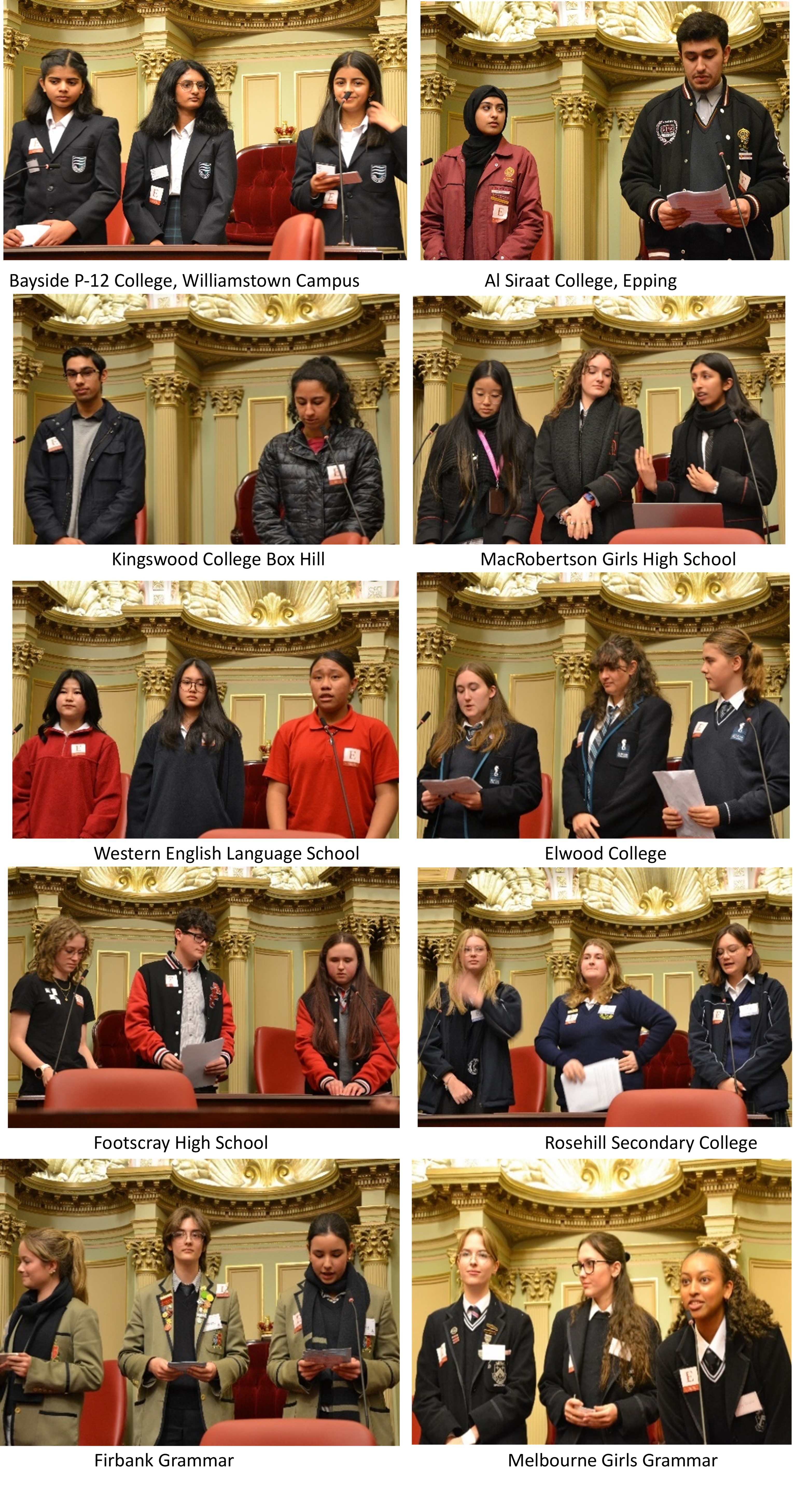
March Council Speakers
In 2022 media reported on the Plan International Australia Survey of 1000 young women in Australia that: Three quarters of young women voting for first time in the federal election do not believe Australian politics is an equal space for women and people of colour - Plan International Australia.
The data is part of Represent Us, a report launched on 9 May 2022 by Plan International Australia, the charity for girls’ equality that laid bare the “white boys club” that is the Canberra bubble and includes powerful recommendations on how we can make Parliament more equal and safe, right now. Interested to hear directly from young people and consider opportunities for NCWV to support same Plan International Australia Team spoke with us ahead of IWD 2023. Susanne Legena, CEO, and members of her team including Youth Activists, presented at our twilight March Council Meeting in person at Ross House and by ZOOM: Thursday 2 March 2023 at 5pm about the Survey of 1000 young women, their concerns and achievements. See March newsletter.
February Council Meeting
February Council Meeting, Speaker: Janet Cribbs, CEO Trades Women’s Australia (TWA), a not-for-profit organisation aiming to increase representation of women in skilled trades. Janet spoke on Pathways to Trade and the Trades Women Community Foundation and how they are achieving cultural change. Please see the February Newsletter for a precise of her speech.
62nd Pioneer Women’s Ceremony – Monday, January 30, 2023
This was held at the Pioneer Women’s Memorial Garden in the Kings Domain, Melbourne. This once again celebrated Victorian Pioneer Women, conducted annually by the NCWV to acknowledge past and present women pioneers.
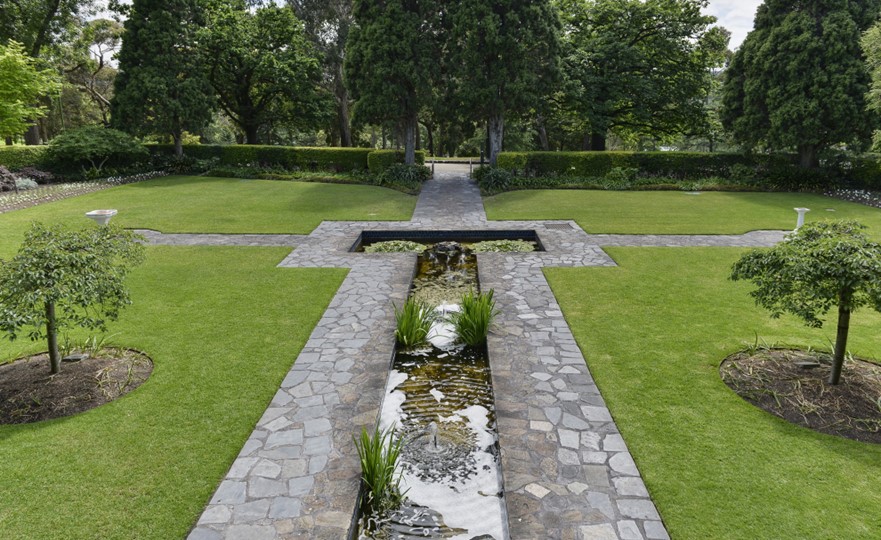
As 2022-23 is the 150th Anniversary of Secular and Compulsory Education in Victoria, the focus was on pioneering women teachers. Dr Deborah Towns OAM, co-author of the history of the Secondary Education in Victoria and numerous articles on education and teachers in the Independent, Catholic and Government systems, highlighted the women pioneers in Education and the early schools. She began with First Nations educators, then teachers in kindergarten, catholic, independent and government systems. For details and photos please see the February Newsletter.
September Council Meeting: September 1
The speaker prior to the AGM was Dr Deborah Towns OAM. To celebrate 150 years of Public Education in Victoria, her keynote was ‘A lively history of 150 years of the government’s education system, and its schools, teachers and students in the Victorian community’. Deborah is an award-winning historian and sociologist and shared the Victorian Community History Award with co-author Dr John Andrews for ‘A Secondary Education for All?’ Deborah was the pioneering manager of the Equal Opportunity Unit in the Education Department in the 1980s. She is President of the League of Women Voters Victoria and State Convenor of NCWV’s Standing Committees. Read excerpts from her keynote.
Individual Members General Meeting, August 4
At this meeting, Convenor, Elisabeth Newman reported on the 20/21 year, then vacated the chair for the election:
Convenor-Elisabeth Newman AM; Bookkeeper-Beverley Kannegiesser; Notetaker-Carol Robertson; Deputy Convenor-vacant. Members asked to consider nominating.
This was followed by Ronniet Milliken who spoke about her own story of COMMUNITY ENGAGEMENT. Ronniet gave us a background of the many years of her education across Australia, New Zealand and the UK. As the daughter of an army officer – ‘an army brat’ – she spoke of the very strong sense of community in each of the army postings her father held, where the members and wives had support for the issues they experienced. Full story in August newsletter
At the August Council meeting we heard from Viv Nguyen, Chairperson of the Victorian Multicultural Commission. VMC supports and advocates for culturally and linguistically diverse Victorians. As the main link between communities and government, they engage with multicultural and multifaith groups to understand issues they face, then work together to identify and recommend potential solutions to government, policymakers and community organisations to make public services more inclusive and accessible. Ms Nguyen outlined various ways VMC supports groups:
-
Adapt family violence services to support multicultural groups, many of whom include great diversity within.
-
Are ‘Diplomatic Agitators’ for multicultural service providers to increase services and grow capacity in prevention and/or support
-
Communicating with communities stepped up during COVID to provide resources well ahead of government. Two-way engagement is vital, which has improved.
-
Support pre-school and kindergarten services, which helps the inclusion of children, also of women. Ms Nguyen explained that VMC is government funded with staff part of the public services sector.
“The results of the 2021 National Census tell us that our state is now home to over 300 different ancestries with 290 languages spoken across the state, making us the most diverse state in Australia, a fact to be proud of.”
My Vote My Voice: The Role of Treaty in achieving Reconciliation, 2022
The National Council of Women of Victoria’s annual student event My Vote My Voice was held in the Legislative Council Chamber, Parliament of Victoria on the morning of Monday 22nd August 2022, 9:15-12:30pm.
This year’s theme was My Vote My Voice: The Role of Treaty in achieving Reconciliation, designed to encourage students to investigate the issues around treaty and reconciliation.
We were delighted that our Keynote speaker was Leanne Miller, Member for North-East Region, proud Dhulanyagen Ulupna of the Yorta Yorta people, Member of the First Peoples’ Assembly Victoria
The event commenced in Queen’s Hall for welcome and photographs. We were welcomed there by Fiona Patten, leader of the Reason Party who has a seat in the Victorian Legislative Council, representing the Northern Metropolitan Region.. Moving into the Legislative Council Chamber Ronniet Milliken, President NCWV acknowledged the people of the Kulin nation as the Traditional Owners of the land on which we meet today, and pay my respects to their Elders past, present and emerging. She then welcomed guests, panel members, teachers and students.
Ronniet then continued: “This year NCWV celebrates the 120th anniversary of our foundation in 1902 and achievements since that time. We wonder whether our founders dared to dream that one day our patrons - the Governor of Victoria, and the Lord Mayor of Melbourne - would both be women!
We honour our founders, their successors, and achievements in advocating for the well-being of women, girls and families across Greater Melbourne, Geelong, regional and rural Victoria. On many occasions that advocacy has resulted in legislation enacted in the Victorian Parliament in which we meet today.
We acknowledge the significance of First Nations, migrant, and refugee women leaders to the formation of our culture and Victorian society. While women in Australia were granted the right to vote and stand for federal election in 1902 and in Victoria in 1908, First Nations people and non-European migrants were not granted the right to vote at that time.
For 120 years NCWV has been advocating FOR respect, physical safety, education at all levels, and equal pay for equal work. We advocate AGAINST discrimination on gender, race, or marital status; violence in the home; and harassment in workplaces and public places. While our tenacity is bearing fruit, we recognise there is still work to be done in conjunction with our diverse community, to embed these changes in our culture.”
Ronniet then introduced the keynote speaker: Leanne Miller, Dhulanyagen Ulupna woman of the Yorta Yorta people, Member for North-East Region, and Elected Member of the First Peoples’ Assembly of Victoria.
We then heard speakers from Ivanhoe Girls’ Grammar, Bayside P-12 College, Williamstown Campus; Kingswood College; MacRobertson HS; Elwood College; Blackburn HS; Star of the Sea College. All speakers had researched the theme well and spoke confidently, with different perspectives taken by each school. Their presentations were inspiring and passionate. Schools also brought students as observers, some parents attended and many NCWV members and their guests.
An evaluation sheet was completed by panel members Elida Brereton, Vice-Principal NCWV, Leanne Miller, and Cr Trent McCarthy, Darebin Council.
Details and Award winners in October Newsletter
July Council Meeting: Modern Slavery and Trafficking
The focus of the July Council meeting was Modern Slavery and Trafficking. One speaker was Caroline Gowers, Executive Director of Project Respect, a Victorian based organisation that is a specialised support service for women with experience in the sex industry, including those who have experienced trafficking. They connect to and create community; offer free, confidential, non-judgemental support, amplify the voices of women with diverse lived experiences and build the capacity of workforces to provide appropriate support. The other speaker was Professor Jennifer Burn Director, Anti-Slavery Australia, Professor of Law, University of Technology Sydney. Both women provided us with an academic basis for our advocacy and proposed practical action. Individual members and our network of associates and organisations are invited to hear the call to action – along with NCWV. See the link to a letter guide, the speeches and more in the July Newsletter.
June Council Meeting
Speaker at our June Meeting: Ms Jan Shuard PSM, Family Violence Reform Implementation Monitor (FVRIM)
Ms Jan Shuard served as Commissioner for Corrections Victoria for five years, overseeing the state’s adult corrections system. Her outstanding contribution to the public service was acknowledged in 2011 with a Public Service Medal. She has worked on family violence rehabilitation and prevention and the coordination of prisons across the Victorian and Western Australian justice systems. Ms Shuard was appointed as the new FVRIM, taking up her role on 2 October 2019.
After 4 years of progress in implementing family violence reforms, Ms Shuard spoke on some of the themes outlined in the last annual report and since that time and the reviewing process undertaken, including:
What has changed since the Royal Commission into Family Violence?
Implementation reviews
Change to a Monitoring approach and reporting
Opportunities for Continuous improvement.
To read about her presentation, there is an account in the June Newsletter
Also included in the June Newsletter are the talks from the speakers at our May Forum on STEM
61th Australia Day Pioneer Women’s Ceremony, 2022
This once again celebrated Victorian Pioneer Women, conducted annually by the NCWV to acknowledge past and present women pioneers, this year at the Pioneer Women’s Memorial Garden, Kings Domain in beautiful sunshine. As 2022 is the 120th Anniversary of NCWV, the focus was on pioneer women who established Victorian women’s organisations and who have continued these organisations up until today. Dr Judith Smart AM, co-author of the history of the NCW Australia, Respectable Radicals gave an overview of the history of women’s organisations and the Great Granddaughter of Janet Lady Clarke, Barbary Clarke, also spoke.
Dr Judith Smart AM, co-author of the history of the NCW Australia, ‘Respectable Radicals’ gave an overview of the history of women’s organisations, then a panel of speakers from some of the founding groups of NCWV spoke about their beginnings and where they are today. The Great Granddaughter of our first President, Janet Lady Clarke, Barbary Clarke, also spoke.
>>Read the program
Those who met on 19 March 1902 were:
- the Austral Salon of Music, Literature and the Arts;
- the Melbourne Jewish Women’s Guild;
- the Young Women’s Christian Association – Y.W.C.A; and
- the Woman Christian Temperance Union – WCTU.
Powerful herstories have been included in the April Newsletter courtesy of our brilliant speakers. It was a glorious morning in our Pioneer Women’s Memorial Garden, and wonderful to hear from the founding organisations their stories and examples of strong women heroes.
With advocacy for change, it can be rather frustrating when we seem to be repeating ourselves. As you read about early heroes, recharge your passion for advocacy for equality for girls and women of Victoria. NCWV members have provided voluntary and selfless service in support of the women and girls of Victoria for 120 years - instigating many beneficial changes. History of NCWV.
Congratulations to our Editor Pam Hammond for this comprehensive Newsletter for April. Please send the Newsletter or link on to your network and extend our reach.
Dr Deborah Towns OAM introduced Dr Judith Smart AM, and began by recognising 2022 as a significant year not only for NCWV, but for all Australian (white) women who won the right to vote and stand for election in 1902. Victorian women had to wait until 1908 to vote in state elections and stand in 1924. Vida Goldstein, an early NCWV member was one of the suffragists who campaigned tirelessly, then unsuccessfully stood many times as an independent candidate. Judith is an Adjunct Professor at RMIT, an academic who has inspired and supported me and many others. She has many publications and continues to write books and articles. Of importance to us today is that Judith co-authored with Dr Marian Quartly, Respectable Radicals: A History of the National Council of Women of Australia, 1896-2006. NCWV stories are in there too, but Judith has prepared her talk with new material about NCW Victoria and what we have got up to since 1902.
Judith Smart AM highlighted the amazing women and their activism in the past. Thousands of women all over Victoria are working for women in so many areas that we continue to try and improve today. Equal pay for one. Domestic violence; Safety in workplaces; Homelessness; Health; Childcare and more. She brought all this work to the forefront of Victoria’s history. We have so many women to thank from the past.
>> Her speech
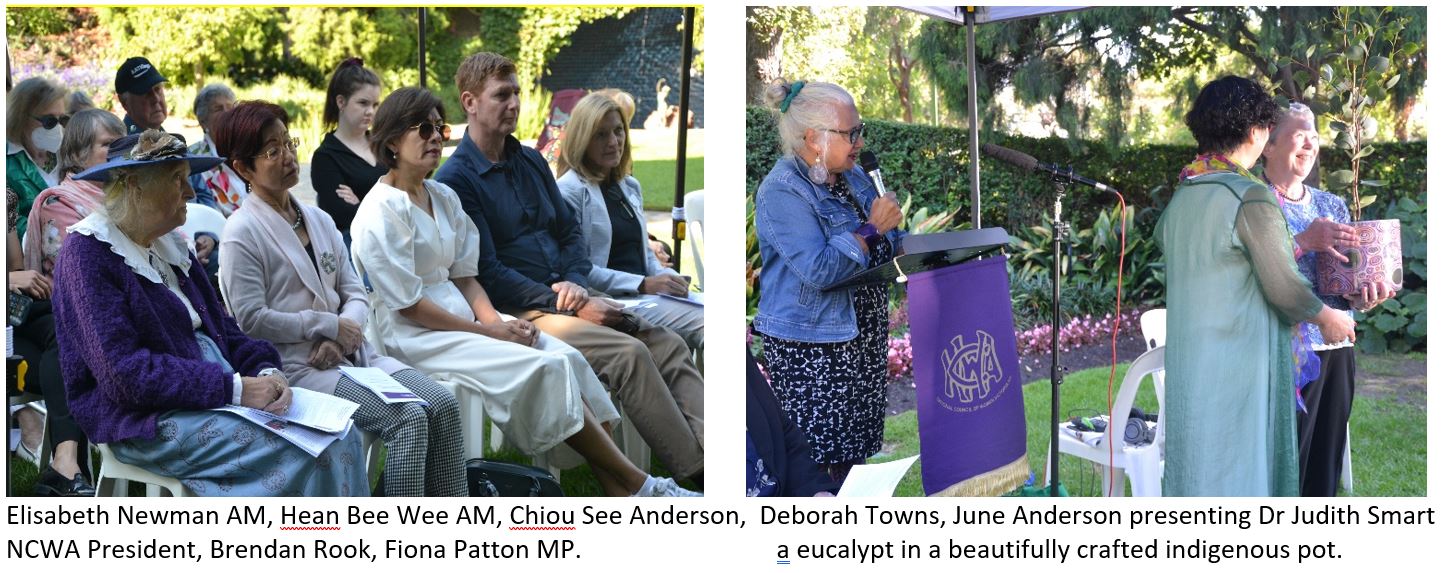
Barbary Clarke, Great granddaughter of Janet Lady Clarke Barbary spoke of her ancestor’s women-centred activism. On reading her biography, I was astounded at what her Great grandmother accomplished, including founding with Vida Goldstein and others NCWV, welfare of community and advancement of women, also inspiring others. Barbary spoke of her Grandmother Ivy’s parents, Pattie and Alfred‘s passion for equality of women and men along with her husband Herbert Brookes and Ivy’s activism with NCWV for 50 years. She was on the NCWV Executive from 1912, President in 1938 when she represented Australia at the 50th Anniversary conference of the International Council of Women in Edinburgh. She was NCWA President 1948-1952 and was appointed life vice president. This was a productive time for NCWV,… active on marriage legislation, equal pay and migration policy – and the election of women senators from amongst its own ranks. Collaborating with Elizabeth Couchman in 1944, Ivy brought the Australian Women's National League into Menzies’ new Liberal Party of Australia – but only after equal representation of women and men on all committees was guaranteed. In 1937 Ivy represented Australia at the League of Nations Assembly in Geneva, the only woman in the Australian delegation, later becoming Vice-president of the United Nations Association of Victoria for 18 years. She was also the first Chairwoman of its Status of Women Committee. See rest of her speech in the April Newsletter.
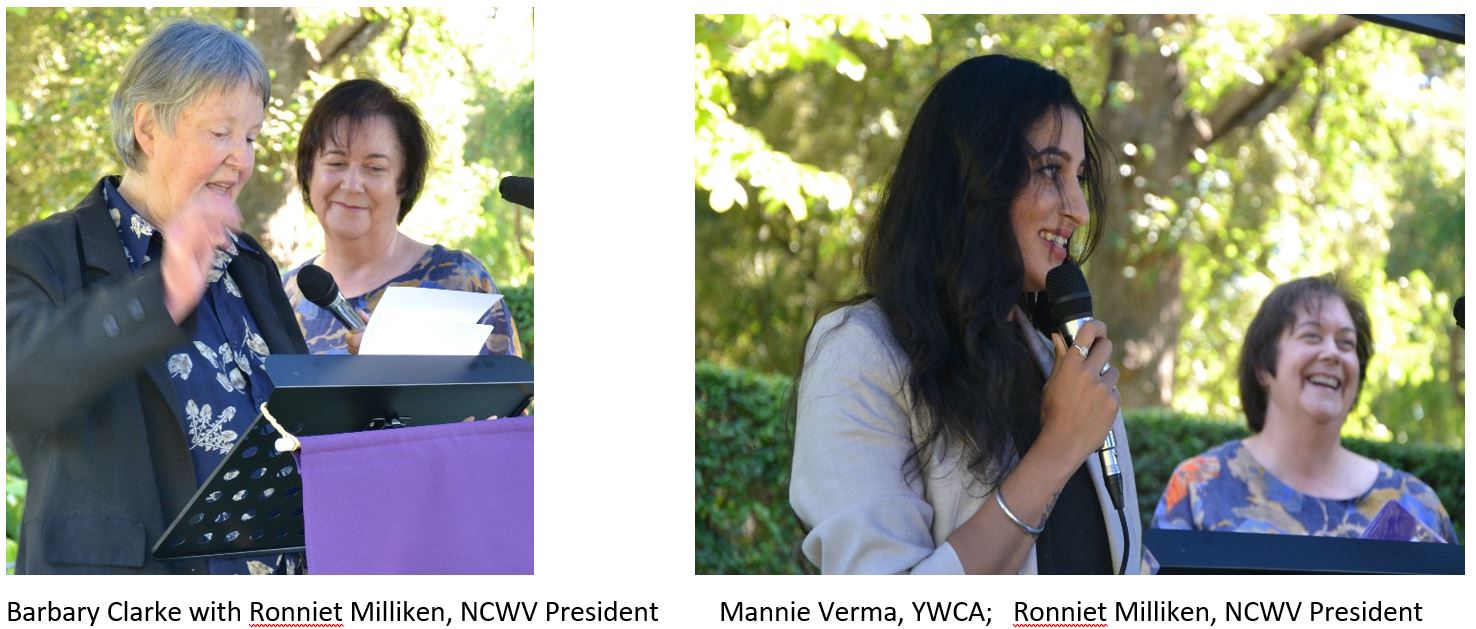
Mannie Kaur Verma, Director YWCA Victoria, spoke as part of the panel representing four of the founding organisations of NCWV who met on 19 March 1902. She spoke with passion about the rich history of YWCA, the Victorian arm founded in Melbourne in 1882 by Sarah Crisp Booth. Mannie emphasised the strong bond between YWCA and NCWV 120 years ago and still there today with the commitment to gender equality unwavering. She stressed that such organisations who have stood the test of time have done so on the shoulders of remarkable women who paved the way. And while across YWCA’s 140-year history many things have changed, the intention to support all women to aim high and live a noble life has not. Indeed, for both organisations, a desire to best serve the women and girls of Victoria and Australia remains. That desire driven by the remarkable women of these organisations has helped reduce the gender pay gap, delivered family law reform and improved support for survivors of domestic, family and sexual violence. These are just a few of the ways the NCWV has also made a significant contribution to making gender equality a reality, which YWCA has been proud to support as an affiliate. However, she emphasised that work is not over. Mannie, as a lawyer who specialises in domestic violence, sees how far too many women and girls struggle to access the support they need, navigate the complex legal system and find the resources they need to rebuild their lives. The fight for gender equality and to ensure all women and girls can live that noble life is not done.
Beverley Kannegiesser, The Austral Salon Melbourne and NCWV Committee member (above), spoke about the rich history of The Austral Salon of Music founded in 1890 by a group of strong and talented women journalists who based the Austral Salon on similar overseas clubs. She explained that the Austral Salon was to be a meeting place for professional women to discuss current issues, be a platform for informative speakers, for dramatic and musical entertainment. The members were heavily involved in the rights of women and social welfare. They encouraged and financially supported young artists, mainly singers and was also a generous philanthropic group. One of the earliest acts was to send Tilly Aston, a blind girl, to university. Tilly became a leader and a wonderful contributor to society. She is remembered by the federal seat of Aston and the three bells memorial located on the way to the Pioneer Women’s Garden. Beverley spoke of Agnes Murphy, one of the founding journalists, a trail blazer as a journalist, author, radical suffragist, political activist, and as a gifted speaker. Newspapers at the time facetiously described her as ‘pen lady in chief to Melbourne society’, and ‘high priestess of the Austral Salon’. At an Austral Salon meeting in 1891, Agnes gave a lecture titled ‘Letters and Letter Writing’, … referencing an affectionate letter from Napoleon to Josephine; a brutal one from Lord Byron to Lady Caroline Lamb, and an amusing letter by an Irish leader in the rebellion of 1798. In the discussion that followed, it was suggested that telegrams had killed private letter writing, what would they have thought of our present-day emails or worse our tweets. See rest of Beverley’s talk in the April Newsletter.
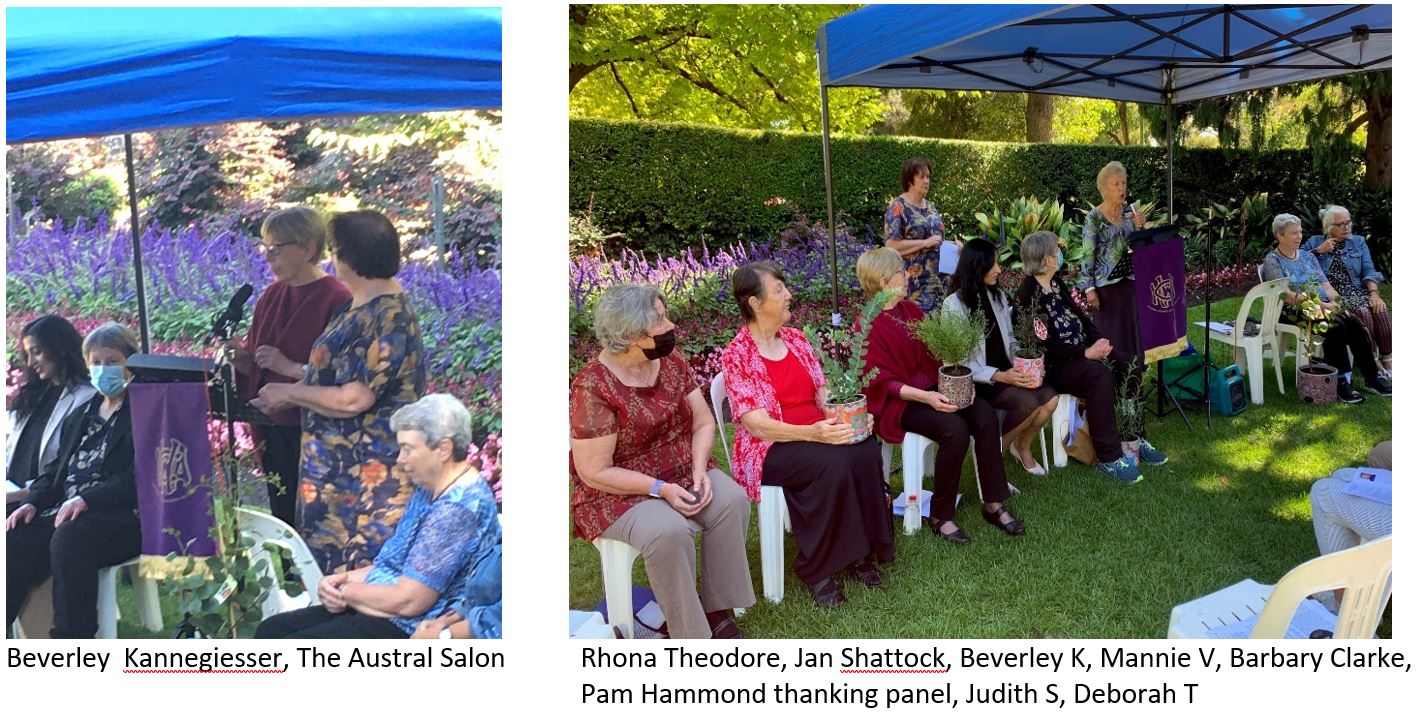
Jan Shattock, Executive member of the Woman’s Christian Temperance Union of Victoria (WCTU), spoke about the purpose of the WCTU from its origin in 1897, set out in its motto – “For God, Home and Humanity”. This was updated in the 1990s to “To promote a Drug-Free Lifestyle and Christian Values in the Home and Community.” Throughout its long history, WCTU has worked and written letters to Members of Parliament and other relevant authorities about issues with which it is concerned, particularly regarding alcohol policy, moral issues and the welfare of women and children, especially regarding family violence. Submissions have been made to ANZFA and others regarding the need for warning labels on alcoholic drinks concerning the dangers of drinking alcohol while pregnant. A highlight at this time was the hosting of the WCTU World Convention in 1995 held at the Townhouse Hotel. Jan spoke enthusiastically about the Drug Education in Schools, developed in the 1970s and 80s. … By 2010, there were two … with about 1000 Grades 5/6 and Years 7/8 students annually in State and Christian Schools (country and city) receiving greatly appreciated presentations …
“Take note, babies and booze don’t mix. No alcohol is the best fix.” Thousands of these sticky note pads were distributed to doctors, Infant Welfare Centres, and anywhere else members went. In 2018 and 2018 advertisements about FASD on buses, …with a no alcohol symbol and message, “For baby’s sake THINK – DON’T DRINK especially if pregnant or hoping to be pregnant.” See rest of Jan’s talk in the April Newsletter.
NCWV End of Year Festive Luncheon, 25th November, 2019
No one in the room could fail to be moved by the words of our speaker Selba Gondonza Luka. Her organisation, Afri-Aus Care is such a boon to her community, contending with the many problems, particularly of young people, encountered when beginning life in a new country. Malawian-born, Selba Gondoza Luka is a Mental Health Clinician specialising in at-risk Youth within the African and CALD (Culturally and Linguistically Diverse) communities. Selba, inspired by her own experiences of domestic abuse and the long process of repairing a fractured relationship with her daughter, came out of the darkness and founded Afri-Aus Care in 2015. The incorporated community organisation is located in Dandenong, Springvale and Pakenham offering biopsychosocial and well-being risk assessment and counselling. Their volunteers are qualified case workers, social workers and psychologists, along with representatives from CALD communities who are able to engage with their clients in a culturally appropriate way. Passionate about breaking the Youth-Prison cycle for many, and closing the gap of Inter-generational Conflict, Selba has been a pivotal foundation for many troubled and fractured families to stabilize on as they take major steps along the path of recovery. Her experience in understanding Youth needs, led to her turning to sport as a Primary Intervention tool and in 2016, along with Jamy Alex, founded the Men’s and Women’s Black Rhinos Peregrine Falcons Basketball and Soccer Clubs. Since their creation the Clubs have worked both inside and outside of prisons to help many more Youth repair the impact of their missteps. This has ensured they forge stronger, positive relationships with their families, broader communities, government and private organisations. Afri-AusCare also offers cooking, gardening, sewing, drug and alcohol diversion programs and education support, also referrals to specific health organisations. NCWV donated $500 to this charity at the end of lunch.
Selba was awarded the Phonse Tobin Award and Meritorious Service to the Community (Voluntary Work) by Victorian Multicultural Commission and shortlisted as one of the 50 Most inspiring African Australians in 2019. Well deserved!
We also had the pleasure of two flautists from Westall Sec College, Emily and Mai, playing carols as people arrived, then ‘In an English Country Garden’ between Entrée and Main course. Absolutely delightful.
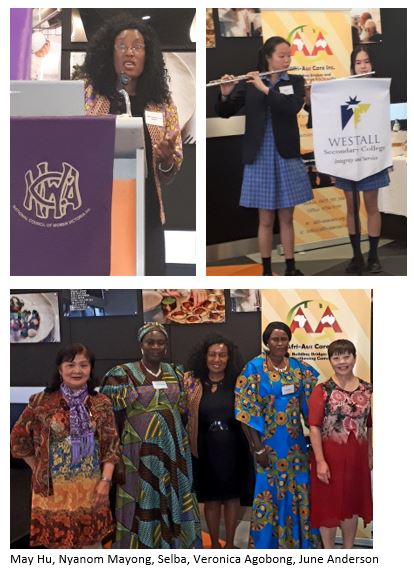
The Annual ‘My Vote My Voice’ Student Event, August 2019
The ‘My Vote My Voice’ 2019 event was held in the Legislative Council Chamber, Parliament of Victoria, on 19 August. This year’s theme was: Male and Female Youth as Future Voters, drawing on NCWV’s partnership with Australian Local Government Women’s Association, the Victorian Electoral Commission and the League of Women Voters’ Bessie Rischbieth Trust. Students were invited to make group presentations on this theme to an audience of students, community members, Parliamentarians and a panel of eminent people.
The event commenced in Queen’s Hall for welcome and photographs. We were welcomed by the Hon Gabrielle Williams, Minister for Women, Youth and Prevention of Domestic Violence. The Keynote speaker was Ms Amy Carpenter, Education Coordinator, Victorian Electoral Commission. She stated how annoyed she gets when hearing people say that young people are apathetic and not interested in what is going on beyond their world. There is passionate action occurring all around, but attitudes towards political processes is reducing.
We then had speakers from Ivanhoe Girls’ Grammar, Melbourne Girls’ College; Oberon HS; Al Siraat College; Fintona Girls’ School; Nth Geelong Sec College; Kingswood College; Westall Sec College; Genazzano College; Coburg HS and University HS. All speakers had researched peer attitudes and spoke confidently on the topic, with different perspectives taken by each school. There were personal anecdotes, passion and humour in the presentations. One common element was that there needs to be more ‘Civics and Citizenship’ content in the core curriculum. Schools also brought students as observers and some parents attended, as well as some Parliamentarians and many NCWV members and their guests.
An evaluation sheet was completed by panel members (and others). Panel members were Cr Coral Ross OAM, Mayor Boroondara and President of MAV; Cr Sandra Wilson, past Mayor of Hobsons Bay; Cr Trent McCarthy, Darebin Council, with Dr Deborah Towns OAM chairing. In addition to this feedback, we have audio of the event provided by the Hansard staff at the Parliament. The following schools have received awards:
-
Pat Goble Individual Award, donated by Ann C Jackson, Mai Kassis, Coburg HS
-
Beryle Foster OAM Group Award, donated by NCWV Individual Members and NCWA, shared between Fintona GGS and Kingswood College
-
Marion Lau OAM Group Award, donated by AABCA, shared between Westall SC and Nth Geelong HS
-
Marie Kirk Group Award, donated by WCTU-Drug -FreeLlifestyles, Methodist Ladies College.
-
Elva Carland Group Award, donated by NCWV Geelong Branch, Oberon HS, Geelong
-
Sylvia Gelman Group Award, donated by Eleanor Sumner, Melbourne Girls College, Richmond
To read the full report, click here.

top of page
NCWV May Forum: Safe Streets for Women & Girls
Held on: 2 May 2019, 10:00-11:30am
ICW-CIF theme: Social protection for all women and girls: Sustainable development for the world This Forum conforms with SDG 11 “… make cities inclusive, safe, resilient and sustainable”.
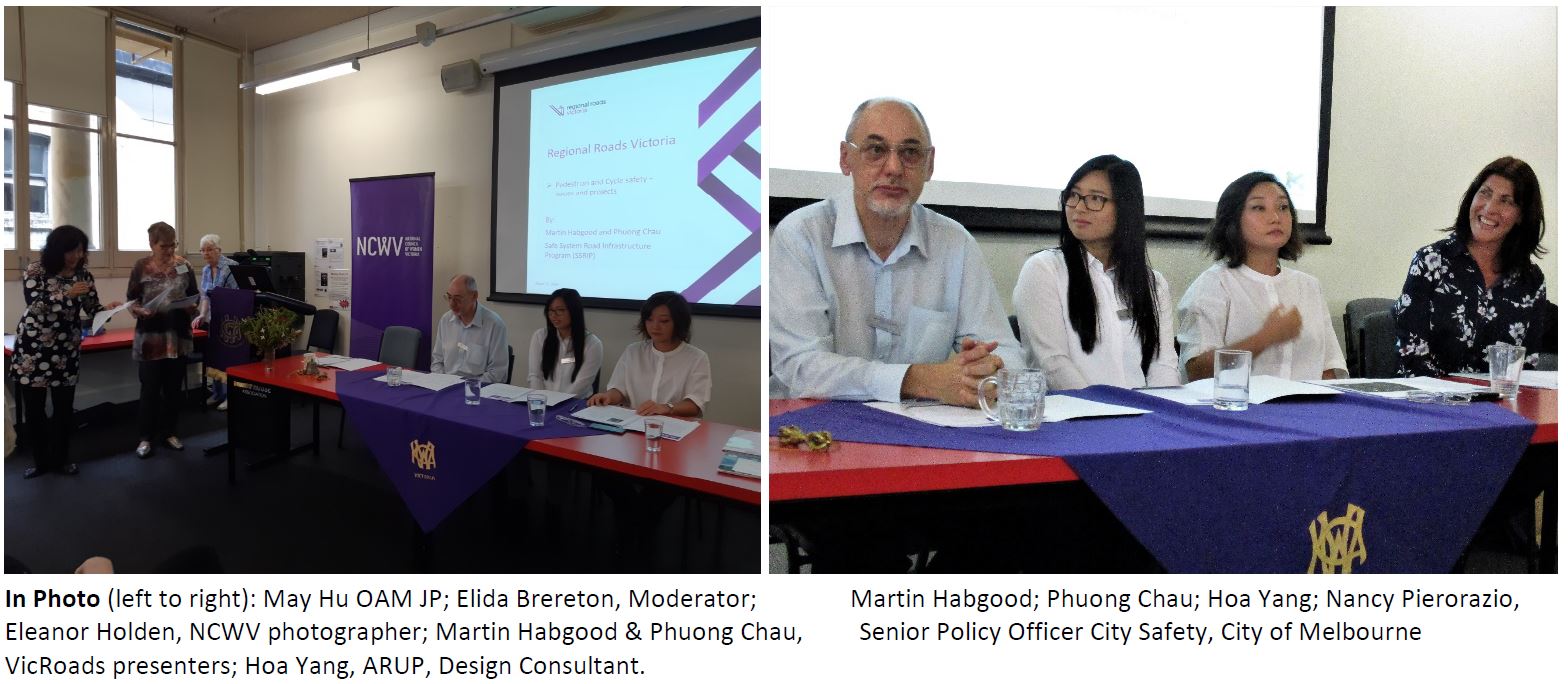
The focus of the May Forum was on what makes a Safe City/Safe Streets. This includes wide streets, pedestrian malls, good visibility, good lighting and clear signage. Everything that is considered to be good planning. The Forum was very well received with positive feed-back, evaluation forms indicated the subject was interesting and topical. An outcome from the Forum for NCWV to pursue, would be the safety of bicycle trailers for children, raised in a question by Janice Latham. There is opportunity for us to monitor the movement and safety of pedestrians and cyclist in the City, also the city lighting to give feed back to the Town Hall. Members could note issues in their area for feedback to local Council.
Martin and Phuong, VicRoads presenters for Safe System Road Infrastructure Program (SSRIP), part of Regional Roads Victoria (RRV), outlined the improvements to accessibility and safety for pedestrians and cyclists being delivered through the SSRIP – Pedestrian Area program, Safer Cycling program and Safe Travel in Local Streets program.
On average there are 40 pedestrian deaths per year and over 500 serious injuries, almost half of which are female. Pedestrians aged 65 and over represent almost one third of the total, with females being just over 50%. This is far too high – we would like it to be zero, but there is a lot of work to do. To help promote active transport (i.e. walking and cycling), RRV encourages councils to:
-
Map out safe routes for walking and cycling to schools and shops in their communities;
-
Develop plans for improving the safety and amenity for active transport;
-
Improving quality of life;
-
Talk to RRV about how these plans could be implemented.
SSRIP developed a hot spot map to target areas with highest densities of fatal and serious injury (FSI) crashes, then contacted those councils to get as many involved as possible. There is a budget of $31 million over 31 councils for this program, including development and evaluation to be completed by 2020. Councils were offered access to funding for development, so that they could engage consultants to develop projects without budget risk.
These include Bayside roundabout crossings, Wombat crossings, Countdown timers, strategic cycling corridors, Protected intersections which provide a safer passage by enabling cyclists to hook turn, let cyclists do left turns more easily, and make it easier for drivers to see cyclists. There is also a Blind Spot Mirror Trial to help cyclists and drivers see each other better and reduce risk of trucks turning into cyclist.
Transport Accident Commission – TAC has made grants available to councils to help them provide better facilities for walking and cycling. VicRoads has grants for local community groups to promote road safety in local areas.
Hoa Yang, ARUP Design Consultant, outlined the findings from a research collaboration between Monash University’s XYX Lab and ARUP. Over the past year, they have analysed lighting measurements across 80 different sites in the City of Melbourne to find practical measures around how we can use lights to make our city feel safer at night time. This project uses a human-centred design approach to generate a framework to understand what lighting qualities give a perception of safety. The research data collected are the beginning of a knowledge bank that gives designers a better understanding of how light impacts urban experiences in Melbourne.
The rate of development in lighting technology in the past decade allows lighting design to be cost effectively customisable and tailored to the individual experience. The amount of design decisions that can be made due to these advances, position lighting as a key enabler of smart design.
New and retro-fitted lighting opportunities are happening all around the world, presenting an opportunity for city design to use light to curate positive experiences.
The current Australian lighting standards for pedestrians are based on pre-LED technology and are in need of a re-think. The standards revolve around the amount of light falling on a surface, and do not consider the perception of brightness and experience of the larger urban context by its users. The tendency in designing for public spaces to choose a worst-case scenario by stakeholders to de-risk, too often resulting in a poor lit outcome. This design approach often leads to over lighting spaces resulting in negative experiences of the space due to glare, also contributing to light pollution and excess energy consumption. Safe perceptions of spaces correlate generally with a higher level of colour rendering, suggesting that distinguishing shapes and colours more accurately makes people perceive spaces as safer. This validates current design principles where people feel more comfortable in warm coloured light. The research has created the largest sample of night time analysis known to the researchers globally.
The findings from the measurements have allowed definition of a baseline for the lighting qualities that contribute to a safe perception of space in Melbourne for young women and girls. Contact: [email protected]
Nancy Pierorazio, Senior Policy Officer City Safety, Social Investment branch, City of Melbourne: Designing in safety for women, outlined City of Melbourne’s commitment to preventing violence against women, promoting women’s safety and advancing gender equality in the municipality and workplace. City of Melbourne projects include: “Women in the life of the city”, a partnership with Victorian Women’s Trust to develop a list of notable women to address the gender bias in street names. Since the introduction of this list, three new streets/lanes have been named: Warrior Woman Lane (Lisa Bellear), Hoff Boulevard (Dr Ursula Hoff), Bale Circuit (Alice Marian Ellen Bale).
“Girls Walk, Melbourne CBD”, Working with Plan International to pilot their Free to Be campaign in Melbourne: Hosted Girls walk of Melbourne CBD; Free to be digital mapping tool; Design thinking workshop (led by XYX Lab).
“Women’s Right to Walk Freely” Partnership with Victoria Police, Victoria Point Owners Corporation and Plan International to better understand safety issues and needs of women and girls who live, work and visit the Stadium Precinct and Docklands. Project involved: Day and night safety audit of precinct; Girls walk: Plan youth activists and local female residents took decision makers on a walk to share experiences; Safety audit report and recommendations provided to Victoria Point Owners Corporation and Development Victoria.
“Safe Nights Out for Women (SNOW)” Pilot of a gender and safety audit tool in five licensed venues to help identify design elements and management practices that may facilitate sexual harassment in and around licensed venues. “Equality (Art) Works” Commissioned female artists to deliver public art work by and for women:
-
“Princess” by artist Baby Guerilla in Russell Place
-
“Make every place equitable” by artist Klara in Equitable Place
-
“Throw like a girl” by Gert Geyer at North Melbourne Recreation Centre (partnership project with WHV)
“Guide to reporting sexist advertising” Helps people navigate process for formal complaints; provides links to online advocacy tools; encourages community to play an active role in challenging culture of violence against women.
Projects underway:
-
Fact sheet on how to design events that are safe and inclusive for women and girls.
-
Facilitating access to training on sexual harassment and bystander action for licensed venues.
-
Pilot walking tours and walking groups aimed at increasing women's safety and participation in public places.
Contact: [email protected]
Q&A Session raised the following issues, responses included:
-
Safety around public transport: more officers are being employed to assist safe walking to cars etc. also development of infrastructure to reduce speed and isolate trams.
-
Children transported in carts behind/in front of bikes: VicRoads review allows these on pavements now.
-
Men in lycra using road as speedway: needs more monitoring and education.
-
Lights being checked regularly: there is a set schedule to check all lighting.
-
Need walking etiquette signs in city: CoM looking at using international symbols instead of words.
-
Overseas visitors driving concerns: VicRoads data doesn’t support an issue with this.
-
Protective officers not always obvious at night: Need to put in a complaint.
-
Some road signs are not visible due to vegetation or damage: alert VicRoads.
The May Forum, “Families: Support for Children”, held on May 3rd 2018, was well attended by NCWV members. This was chaired by May Hu JP OAM, Coordinator NCWV Standing Committee, and moderated by Elida Brereton, Executive NCWV and Board member of the Hornbrook Academy. Anne McLeish OAM, CEO Grandparents/Kindship Carers Victoria spoke on ‘Family Rights’ saying it’s important that grandparents have their voices heard and that in Victoria there is insufficient representation for children. Dr Allison Cox, Berry St Director of Take 2 Program, which provides therapeutic services for traumatised children to achieve physical and emotional safety for them via work on attachment. In 2015/16 in Aus. there were 13,000 children in out of home care. Liana Buchanan, Principal Commissioner for Children and Young People spoke on ‘Human Rights in the home: Children’s rights to safety, care and protection’. She has an oversight to children’s services, including enquiries about individual children and systemic issues. There is a huge underestimation of danger to children in family violence. Anne recommended a statewide symposium, with relevant politicians and organisations included to come up with positive recommendations. This will be linked to other NCWV Respect projects such as Troubled Youth.
Full report by Terri Dry click here
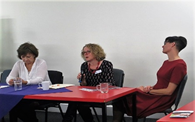
Anne McLeish OAM, Dr Allison Cox, Liana Buchanan

Strategic planning advice obtained by NCWV from Deakin University and the pink paper exercise from early 2013 confirmed the urgent need for National Council of Women of Victoria to bridge the generation gap by embracing the new social media and to find ways of involving younger women in its work.
In order to create a framework to engage younger women, we looked for an opportunity to have some young women to take on a task that could be successfully accomplished within a given time frame.
The idea is to get the under 30s to facilitate the involvement of the secondary students in the NCWV project ‘My Vote, My Voice’ linked to the Victorian Electoral Commission Passport to Democracy program.
We have been trying to involve younger women through one or another of our affiliate or partner organisations working under the supervision of an experienced NCWV member.
Thanks to some great work by the younger women with whom we already have contact, we now have a social media set up for YoungNCWVIC. This will help their work with us on projects like the My Vote, My Voice students event at the Parliament of Victoria each year.
The Gmail address is young[email protected] and a blog has been created at the youngncwvic Wordpress page linked with with Facebook, Twitter, Tumblr and Hootsuite links. Tumblr is a way of enabling students to post photographs of themselves working on the presentations they will bring to the Parliament if they choose to speak at our annual event and thus helps build momentum for engagement in the project, as well as act as a base set of information about the progress of the project.
For more information on this year's My Vote, My Voice event click here
Instilling Respect For Women Starts From The Ground Up!
Women have rights and responsibilities.
All women are deserving of respect.
The NCWV has produced this brochure to raise awareness among affiliates, organisations and individuals about women’s rights and responsibilities. Please feel free to print the brochure and use it as a starting point for raising awareness and discussion in your organisation or with others who may find it useful.
>> Click here to download the brochure.
|
